



Copyright infringement not intended
Picture Courtesy: NEWSONAIR
The Ministry of Electronics and Information Technology in collaboration with the World Health Organization (WHO) has announced a global call for abstracts highlighting impactful and scalable applications of Artificial Intelligence in health systems
|
Read all about: |
MeitY's IndiaAI Mission and the WHO are jointly developing a "Casebook on AI Health Use Cases Across the Global South."
Global South researchers, innovators, and institutions are invited to submit abstracts for successful, implementable, and scalable AI healthcare solutions.
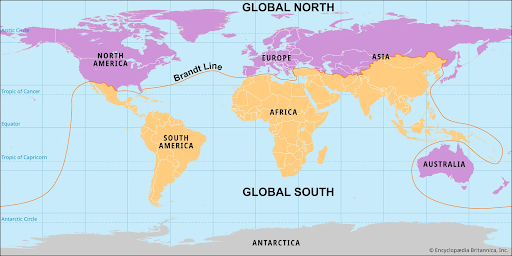 Objective
Objective
The Casebook will be a comprehensive reference for policymakers, innovators, and researchers, facilitating the replication and scaling of successful AI health solutions in developing economies.
Submission Details
Participants must submit abstracts (maximum 250 words) by October 31, 2025.
Shortlisted contributors will then be invited to submit full chapters (2,500-3,000 words) by December 15, detailing the AI solution, deployment strategy, ethical considerations, achieved impact, and lessons learned.
Launch
The Casebook is scheduled for launch at the India-AI Impact Summit 2026 in New Delhi in February.
AI refers to computer systems and algorithms that mimic human intelligence to perform tasks, learn from experience, adapt to new situations, and solve complex problems.
AI uses advanced algorithms and datasets to aid healthcare in diagnosis, disease prediction, personalized treatments, and overall delivery.
The global AI in healthcare market was valued at about $26.57 billion in 2024 and is projected to reach $187.69 billion by 2030. (Source: Grand View Research)
Advanced Diagnostics and Disease Detection
AI deep learning models analyze medical images (X-rays, MRIs, CT scans) faster and more accurately than humans, and accelerate early detection of conditions like cancer, diabetic retinopathy, and cardiac issues.
Indian startup Qure.ai's qXR system quickly analyzes chest X-rays for abnormalities like tuberculosis. Google partnered with Indian startups Forus Health and AuroLab to expand diabetic retinopathy screening.
Accelerated Drug Discovery and Development
AI accelerates drug development, reducing timelines and costs by up to 50% and driving 30% of new drug discoveries by 2025. (Source: World Economic Forum)
Indian pharmaceutical companies like Sun Pharma and Dr. Reddy's Laboratories are deploying AI to tackle high-burden diseases such as tuberculosis and diabetes.
Personalized Medicine and Treatment Planning
AI analyzes patient data (genetics, lifestyle) to predict disease, personalize treatment, boost efficacy, and minimize side effects, advancing hyper-personalized medicine.
Startups like Healthi use AI to provide personalized health insights and recommendations based on genetic tests and health records.
Predictive Analytics and Public Health
AI analyzes data (epidemiological, social media, environmental) to predict disease outbreaks, hospitalizations, and resource needs, facilitating proactive public health management.
The 'Media Disease Surveillance' (MDS) tool, an AI-driven solution by the Ministry of Health and Family Welfare (MoHFW), scans digital news sources to support event-based surveillance for infectious diseases.
Enhanced Telemedicine and Remote Monitoring
AI drives advanced telemedicine and remote patient monitoring, expanding quality healthcare to remote areas. AI chatbots offer targeted, virtual assistance, and specialist consultations.
Practo, an Indian digital healthcare startup, employs multilingual AI to power its telemedicine services, breaking down language barriers.
Robotics in Surgery and Care
AI-powered robotics enhance surgical precision and shorten recovery times in minimally invasive procedures.
AI-driven wearable devices continuously monitor vital signs, providing early alerts to medical professionals to avert health emergencies.
Streamlining Administrative Efficiency
AI virtual assistants and generative AI streamline administrative tasks in healthcare, such as scheduling and documentation, thereby lessening staff workload and boosting efficiency, allowing healthcare professionals to focus more on patient care.
Data Privacy and Security
AI systems need extensive patient data, raising privacy concerns due to potential breaches, unauthorized access, and ethical issues in using personal health information.
Algorithmic Bias and Fairness
AI models can worsen existing healthcare inequalities in diverse countries like India by amplifying biases from their training data, leading to discriminatory outcomes.
Regulatory Frameworks and Accountability
The regulation of AI in healthcare is still in its nascent stages globally, including in India. Establishing clear legal frameworks for accountability and liability in case of AI-related errors is crucial.
Lack of Specialized Talent and Infrastructure
Healthcare AI adoption is hampered by a shortage of specialized talent (technical and domain-specific) and insufficient digital infrastructure in many facilities.
Interoperability and Data Quality
Health data is often siloed, unstructured, and lacks standardization, making it difficult to train robust AI models and ensure seamless data exchange between different systems.
Lack of Transparency (Black Box Problem)
AI models operate as 'black boxes,' where their decision-making process is opaque. This lack of explainability hinders trust among clinicians and patients and complicates legal or ethical scrutiny.
High Costs of Development and Deployment
Underfunded healthcare systems, India spends only 3.8% of GDP on healthcare, face barriers to investing in high-quality AI solutions.
IndiaAI Mission
The Union Cabinet approved ₹10,372 crore for the IndiaAI Mission to boost AI application development in sectors like healthcare, expanding computing access, research, and startup support.
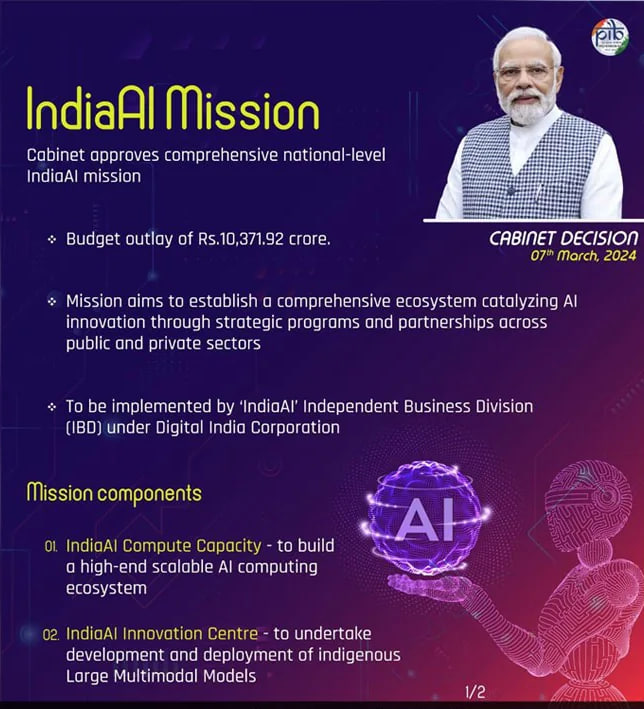 NITI Aayog's National Strategy for AI (2018)
NITI Aayog's National Strategy for AI (2018)
NITI Aayog emphasizes AI's role in improving healthcare quality, accessibility, and affordability for universal coverage.
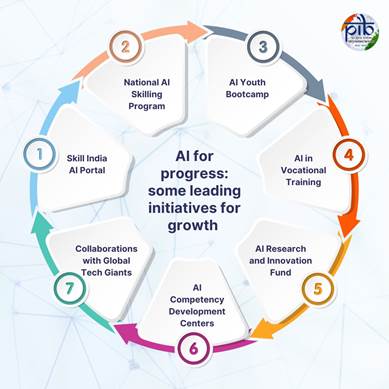 Ayushman Bharat Digital Mission (ABDM)
Ayushman Bharat Digital Mission (ABDM)
ABDM unifies digital health IDs, linking records to create structured data for AI. It ensures data interoperability and patient privacy via federated learning.
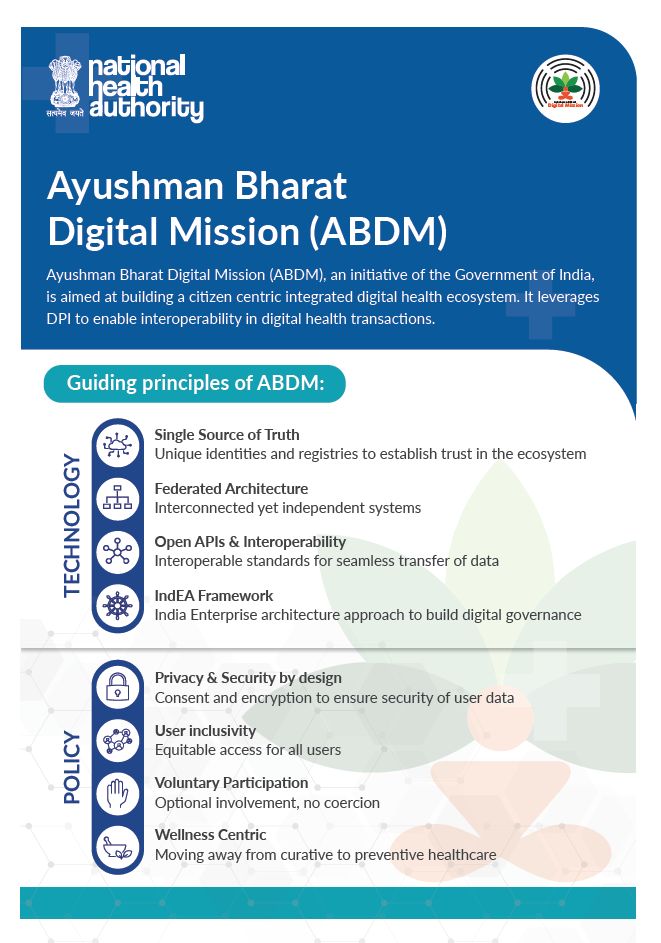 ICMR Ethical Guidelines
ICMR Ethical Guidelines
The Indian Council of Medical Research (ICMR) issued "Ethical Guidelines for Application of Artificial Intelligence in Biomedical Research and Healthcare".
These guidelines establish ten core ethical principles, including accountability, autonomy, data privacy, non-discrimination, and trustworthiness, emphasizing human oversight and informed consent.
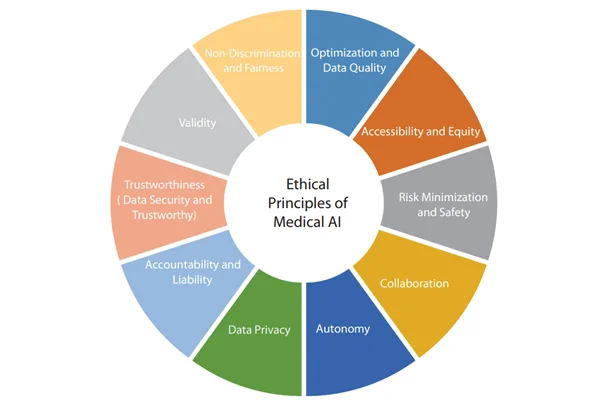 Centres of Excellence for AI
Centres of Excellence for AI
The Ministry of Health and Family Welfare (MoHFW) designated AIIMS Delhi, PGIMER Chandigarh, and AIIMS Rishikesh as 'Centres of Excellence for Artificial Intelligence' to develop AI health solutions.
AI-Powered Solutions by MoHFW
MoHFW has developed the Clinical Decision Support System (CDSS) for e-Sanjeevani, which provides AI-recommended diagnoses, and the 'Media Disease Surveillance' (MDS) solution for early detection of infectious disease outbreaks.
Legal Frameworks
The Digital Personal Data Protection Act (DPDP Act) and the proposed Digital Information Security in Healthcare Act (DISHA) for safeguarding patient privacy and data integrity in AI applications.
Startup Ecosystem
Companies like Niramai (AI for early breast cancer detection), SigTuple (automating medical diagnostics), and Qure.ai (AI for radiology) are revolutionizing healthcare delivery.
WHO Guidelines
In 2021, the WHO released comprehensive guidance on "Ethics & Governance of Artificial Intelligence for Health," updated in 2024.
The WHO stresses human control over healthcare, advocating for rigorous evaluation, independent audits, and impact assessments to prevent bias and ensure equitable access.
EU AI Act
The EU AI Act designates healthcare AI as 'high-risk,' requiring strict adherence to standards in data governance, risk management, quality, transparency, human oversight, and robustness for regulatory approval.
 US Approach
US Approach
The U.S. takes a sectoral, case-law-driven approach to AI regulation. While no comprehensive law exists, the 'AI Bill of Rights' guides algorithmic transparency and privacy, with sector-specific implementation.
Develop Robust Regulatory Frameworks
Establish comprehensive, adaptive, and sector-specific AI regulations that address data privacy, security, accountability, and algorithmic bias.
The DPDP Act is a good start, but specific provisions for sensitive health data, through the enactment of a dedicated law like the proposed DISHA, are crucial for healthcare.
Invest in Data Infrastructure and Standardization
India needs investment in digital health infrastructure to ensure high-speed internet, cloud computing, and digital health records.
Mandating data interoperability using international standards like SNOMED CT for clinical terminology and LOINC for lab results across all Electronic Health Records (EHRs) linked to ABDM is essential for training robust AI models.
Prioritize Ethical AI Development
Develop AI tools adhering to core medical ethics, include ethical principles like fairness, accountability, and transparency (FAT) into AI design, development, and deployment.
Independent audits and impact assessments of AI systems must be ensured.
Address Algorithmic Bias
Mitigate bias by collecting diverse data, developing explainable AI, and continuously monitoring for biased results.
AI Literacy and Capacity Building
Mandatory AI literacy and critical evaluation modules should be integrated into medical, nursing, and paramedical curricula.
Continuous medical education (CME) should focus on algorithmic transparency, model limitations, and preventing automation bias, ensuring human clinicians remain accountable.
Multi-stakeholder Collaboration
Promote collaboration across government, private sector, academia, healthcare, and civil society. Initiatives like the MeitY-WHO call for abstracts are crucial for sharing best practices and scalable solutions.
Incentivize AI Co-Creation at Grassroots
Develop AI for local healthcare, especially at Primary Health Centre (PHC), to address India’s unique healthcare challenges and ensure equitable access.
India must balance innovation with ethics in AI healthcare by strengthening DISHA, advancing ABDM data standards, building skills, and ensuring responsible design to create a healthier, more equitable future for all.
Source: NEWSONAIR
|
PRACTICE QUESTION Q. Analyze the potential of Artificial Intelligence in strengthening public health infrastructure in India. 150 words |
Artificial Intelligence (AI) in healthcare refers to the use of machine learning, deep learning, and natural language processing to analyze medical data, assist in diagnostics, personalize treatment plans, and automate administrative tasks.
Key ethical concerns include data privacy, algorithmic bias, accountability for AI-driven decisions, and the potential erosion of human empathy in patient care.
The future of AI in healthcare includes advancements in precision medicine, real-time monitoring through wearable devices, robotic surgeries, and enhanced patient engagement through AI-driven platforms, all contributing to more efficient and personalized healthcare systems.
© 2026 iasgyan. All right reserved